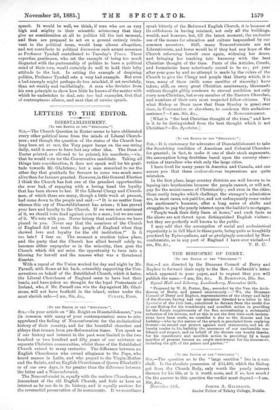TO THE EDITOR OF THE "SPECTATOR."]
Sin,—In your article on " Mr. Bright on Disestablishment," you (in common with many of your contemporaries) seem to mis- apprehend the feeling of Nonconformists for the ecclesiastical history of their country, and for the beautiful churches and abbeys that remain from pre-Reformation times. You speak as if our history and interest in the past were limited to the two hundred or two hundred and fifty years of our existence as separate Christian communities, whilst those of the Established Church extend to many centuries. The difference between an English Churchman who owned allegiance to the Pope, who heard masses in Latin, and who prayed to the Virgin-Mother and the Saints, and an English Churchman of Queen Elizabeth's or of our own days, is far greater than the difference between the latter and a Nonconformist.
The Nonconformist is, equally with the modern Churchman, a descendant of the old English Church, and feels as keen an interest as he can do in its history, and is equally anxious for the reverential preservation of its monuments. If we sometimes speak bitterly of the Reformed English Church, it is because of its selfishness in having retained, not only all the buildings, wealth, and honours, but, till the latest moment, the exclusive use of the means for education and culture bequeathed by our common ancestors. Still, many Nonconformists are not Liberationists, and fewer would be if they had any hope of the Church reforming herself once again, widening her doors, and bringing her teaching into harmony with the best Christian thought of the time. Parts of the Articles, Creeds, and formularies have notoriously ceased to be so ; yet year after year goes by and no attempt is made by the rulers of the Church to give the Clergy and people that liberty which, it is true, many of them (with some sacrifice of sincerity) have taken; still, on every great Christian anniversary, thousands without thought glibly condemn to eternal perdition not only every non-Christian, but every member of the Eastern Churches, and numbers of their own most respected fellow-citizens. Yet what Bishop or Dean (now that Dean Stanley is gone) ever rises, in Convocation or elsewhere, to condemn this audacious
sentence P—I am, Sir, &c., A NONCONFORMIST. [What is " the best Christian thought of the time," and how is it to be distinguished from the best thought which is not Christian P—En. Spectator.]


































 Previous page
Previous page